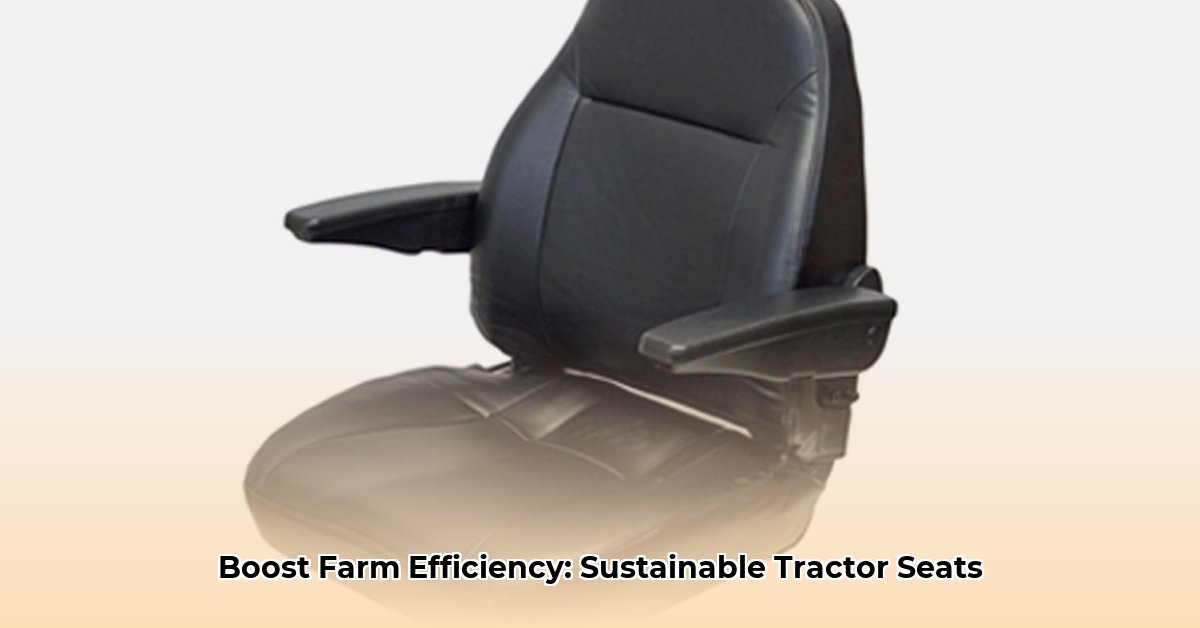
Massey Ferguson Tractor Seats: Driving Towards a Sustainable Future
Selecting the optimal Massey Ferguson tractor seat transcends mere comfort; it necessitates informed decisions that prioritize both farm efficiency and environmental responsibility. This report analyzes the complexities of choosing sustainable tractor seats, offering actionable steps for farmers, manufacturers, and industry stakeholders. For more seat options, check out these alternative suppliers.
Navigating the Maze of Massey Ferguson Tractor Seat Options
The diverse range of Massey Ferguson tractor seats presents a challenge. From basic replacement seats to premium models with advanced features, the choices can be overwhelming. The lack of readily available information regarding material composition and longevity further complicates the selection process. Many seats utilize materials like vinyl or leatherette, durable but with potentially significant environmental repercussions. Moreover, the prevalence of "universal-fit" seats, while seemingly convenient, often leads to manufacturing inefficiencies and compatibility issues, contributing to waste. Do you know how many seats end up in landfills annually due to incompatibility?
Beyond Comfort: The Environmental Footprint of Your Tractor Seat
Sustainable seat selection necessitates considering the entire product life cycle, from material sourcing to end-of-life management. Responsible sourcing of materials is paramount. Are materials recycled, or are they destined for landfills? What is the overall carbon footprint? Farmers increasingly prioritize carbon footprint reduction; choosing an eco-friendly seat contributes to this goal. Materials such as recycled content or bio-based polymers make a difference, as does prioritizing durable designs and prioritizing repairs over replacements. What percentage of your farm's carbon footprint is attributable to equipment disposal?
Practical Steps Toward Greener Tractor Seats
To foster more sustainable practices, specific actions are needed from various stakeholders:
For Massey Ferguson (Manufacturers):
- Conduct a thorough lifecycle assessment (LCA): This comprehensive analysis meticulously examines every stage of a seat's life cycle—from raw material extraction to disposal—to quantify its complete environmental impact.
- Innovate with sustainable materials and designs: Invest in research and development to explore and integrate the use of eco-friendly materials and develop seat designs that minimize waste and maximize lifespan. Consider modular designs to enhance part compatibility and reduce the need for complete replacements.
For Aftermarket Seat Suppliers:
- Promote transparency: Provide clear and complete information on materials used, seat durability, and manufacturing processes. Detailed product information sheets can empower farmers to make informed decisions.
- Partner with sustainable suppliers: Collaborate with companies that adhere to environmentally responsible sourcing and manufacturing practices.
- Offer repair and refurbishment services: Extend seat lifespans by providing repair services and exploring take-back programs for proper recycling or disposal of old seats.
For Farmers:
- Prioritize durability and comfort: A comfortable and durable seat directly impacts operator efficiency and productivity. Invest in a quality seat designed for longevity.
- Consider lifecycle cost: Evaluate the total cost of ownership, including initial price, expected lifespan, repair costs, and end-of-life management.
- Advocate for sustainable options: Communicate your preference for sustainable products to manufacturers and suppliers, driving demand for eco-friendly choices.
For Regulatory Bodies:
- Support clear labeling: Implement regulations demanding clear labeling of seat materials and associated environmental impacts, empowering informed consumer choices.
- Promote sustainable components: Encourage the use of sustainable materials in agricultural machinery through incentives and regulations.
The Data Gap: A Need for Greater Transparency
A significant hurdle is the lack of readily available, comparable data on Massey Ferguson tractor seat models. Price, materials, lifespan, and warranty information are crucial for informed sustainable choices. This necessitates collaboration between manufacturers, suppliers, researchers, and independent testing organizations to generate independent, verifiable data for comparative sustainability assessments. How much would standardized data reporting improve informed decision-making in the sector?
Looking Ahead: A Shared Vision for Sustainable Tractor Seats
The future of sustainable tractor seats hinges on collaboration among all stakeholders. By prioritizing transparency, innovation, and responsible practices, we can build a more sustainable agricultural sector. Let's work together to achieve this shared vision – one comfortable, environmentally conscious tractor seat at a time.
How to Choose Sustainable Massey Ferguson Tractor Seats
Key Takeaways:
- Choosing a Massey Ferguson tractor seat involves multifaceted considerations beyond simple comfort.
- Sustainability is paramount, affecting both farm efficiency and environmental impact.
- Thorough research and a comprehensive understanding of seat features are crucial for sound decision-making.
- Prioritize seat durability for minimizing replacements and waste.
- Explore options for seats composed of recycled materials and those with extended warranties.
Selecting a new tractor seat requires a holistic approach, balancing comfort with sustainability. Follow these steps for choosing sustainable Massey Ferguson tractor seats:
1. Understanding Your Needs
Assess your daily tasks. Long hours demand superior ergonomic design. Identify essential features: air suspension, lumbar support, etc. This streamlined approach improves your search.
2. Assessing Seat Materials
Analyze the materials used. Seek seats incorporating recycled content or lower-impact materials. Durability minimizes replacements.
3. Investigating Seat Lifespan and Warranties
Consider the long-term perspective. A lengthy warranty reflects the manufacturer's confidence in product durability, impacting your budget and waste generation. A longer-lasting seat translates to fewer replacements.
4. Evaluating Suspension Systems
Evaluate the suspension system for operator comfort and fatigue reduction. Air suspension generally provides better comfort than mechanical systems. However, consider energy efficiency and longevity. A robust system reduces repairs.
5. Checking for Compatibility
Always ensure compatibility with your Massey Ferguson model to prevent safety hazards and comfort issues. Consult your manual or dealer.
6. Exploring Manufacturing Processes
Research manufacturing processes for insights into sustainability. Seek out companies employing responsible manufacturing practices, such as reduced emissions or renewable energy use.
7. The Price Factor: Balancing Value and Sustainability
While sustainable options may have higher initial costs, consider long-term savings. A durable seat is ultimately more cost-effective than frequent replacements.
8. Where to Buy: A Guide to Reliable Suppliers
Select reliable suppliers offering clear information, transparent pricing, and robust customer support. Utilize online reviews and direct vendor engagement to assess commitment to sustainability. Ask questions about sourcing or manufacturing practices.